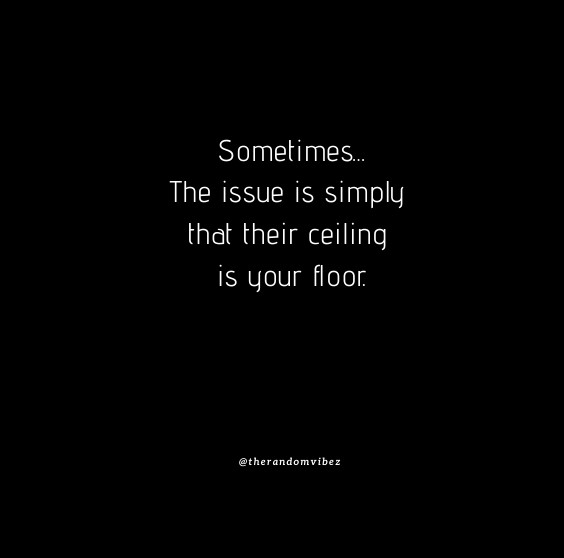Are your standards too high? Or, are they not high enough?
We’ve all had moments when we have felt incredibly picky. Or, we’ve felt like we have been in a situation when we should have asked for or required more.
What I am focused on is helping you create standards that allow you to be you, as well as, help you feel comfortable without worrying where they rank on another person’s chart.
You Should Have High Standards – That Are Reasonable
I like to be the dumbest person in the room. This isn’t meant to be a slight at my level of intelligence, but the best way I can explain why I like to be around people who are smarter and more successful than me. This high standard challenges me to be think differently and motivates me to move toward my goals.
Does this mean I don’t hang around dumb people? No. I hang around plenty of dumb, unsuccessful people. (Please don’t unsubscribe after you read this email.) What I mean by this is that I am also interested in people’s personality and also know that I can be challenged and inspired in a variety of ways. I don’t make life an intelligence or an achievement test.
Also, if I hung around smart, successful people all of the time, I would wear myself out because I can play at 100%, 100% of the time. I can’t challenge myself every moment of the day or every time I want to socialize.
This is called “managing expectations and being reasonable.”
It’s okay to have high standards for yourself and the people around you, but you have to be reasonable in how often you can expect that show up.
Let’s Back Up And Define High Standards
Standards are about mindset about how you want to live, a set of behaviors you expect, and the values and goals you have put in place.
When you have high standards, you expect to be treated in a certain manner. If you have low standards, you usually accept things as they are or don’t expect much. Consider standards as another form of a boundary.
There is a time and place for both high and low standards. Your life should be a mixture of both.
Having high standards can help you achieve your goals, become healthier, and challenge you to do new things. Your high standards can tell people that you believe in yourself and you have confidence. They are intertwined with your self-esteem.
Your standards are reflected by:
- The promises you keep
- How you dress
- How you manage your health
- The quality of your work
- How you communicate with others
- How you manage the environment around you? Clean or dirty? Chaotic or calm?
I have a phrase on a Post-It next to my computer that says, “The quality of your life is a reflection of your standards.”
The Trouble With High Standards Comes In When…
The trouble with high standards comes when you are unreasonable and expect too much from yourself and others around you. Expecting too much from yourself is incredibly stressful. When you don’t meet your standards or someone else doesn’t, you are disappointed, stressed out, and your self-esteem takes a hit.
And, forcing your high standards and expectations on others can be a recipe for disaster and disappointment.
Going back to the reader’s statement that they didn’t want to seem “stuck up” for having high standards – I think that happens when there is no break in your standards. Meaning you expect yourself and others around you to be performing at 100% all of the time. If others can see there are areas in your life where you don’t expect as much from yourself or from them, they are less likely to think you are going to be judging them when they make a mistake or don’t live up their own potential.
How Do You Know If Your Standards Are Too High?
There are signs if you know what to look for:
- Perfectionistic tendencies
- Not allowing yourself (or others) to make mistakes
- Being overly critical of yourself and other people
- Setting goals according to other people’s expectations
- People pleasing
- Taking on too much
- A constant need for achievement
- Expecting to be 100% all of the time
- You don’t have many romantic relationships or you don’t date someone for long
- You refuse to compromise on literally anything
Are Your Standards High Enough?
Low or no standards aren’t great either. This tells people you don’t have boundaries.
Low or no standards are a sign of low self-esteem, a lack of values or goals, and make you prey to other people’s influence. If you have low or no standards, this means you don’t speak up or stand up for yourself. In turn, people don’t treat you well either.
What to shoot for? Knowing yourself well enough that you know what is worth taking on. Your standards are a mixture of high and low based on what is most important to you, you know when to compromise, and you are okay with saying “this is good enough.”
Going back to the readers statement that she didn’t want to be considered “stuck up” for having high standards, this is where I wonder if you may be hanging around the wrong people and it’s good that you have high standards in place to create a boundary. Calling someone “stuck up” for having standards and expectations for themselves is a sign of low self-esteem. So, it is entirely possible that you need to address whether or not some of the people in your life aren’t a match.
This happens all of the time. You outgrow friends or coworkers. Or, you live and achieve beyond what your family expected or can understand.
You aren’t wrong for having high or low expectations. Just be aware that not everyone will understand them, abide by them, or deserves to have a spot on your roster.
Your expectations are meant for you and your comfort. They are there to guide you toward your goals and help you make decisions.
How To Work Toward A Mixture of High And Low Standards
Here are some strategies to try to keep your standards in check:
- Let go of the need to be perfect: This one is easier said than done. We also talked about this in a previous post. Set goals that are realistic and reasonable, let go of mistakes, and know that you don’t have to be good at everything. If you are a perfectionist, start looking into ways to relieve this tendency.
- Stop comparing yourself to others: Social comparison is normal, but when you allow it to control or dictate your goals, decisions, and standards – it’s time to check yourself. Being yourself and being authentic will always get you further and make you happier.
- Question your expectations: Where did your expectations come from? Are they reasonable based on your skills and resources? What do you want to come of them or achieve?
- Understand you will have good days and bad days: When you don’t have the energy to do something, give yourself a break. Lean into that gut feeling that today is not your day or that you may need to take a break. You can’t be 100%, 100% of the time.
- Challenge your inner critic: We are our own worst critic, right? Has it ever occurred to you that you might be wrong about the negative outlook you have on your skills, talents, or the actual outcomes of your work? Challenge yourself to look for the positives first. What went right? What did you do well?
- Do for yourself: People with high standards aren’t focused on their own needs and are more focused on taking care of others. Where you can you create a balance?
- Learn to take a compliment: If you struggle to take a compliment or stop to celebrate a win, it’s time to stop downplaying your accomplishments.
- Stop over-thinking: If you receive feedback – especially negative feedback – create a time limit for how long you will allow yourself to ruminate. The longer your ruminate, the harder you are on yourself. Take note of your mistakes and move on or try again.






